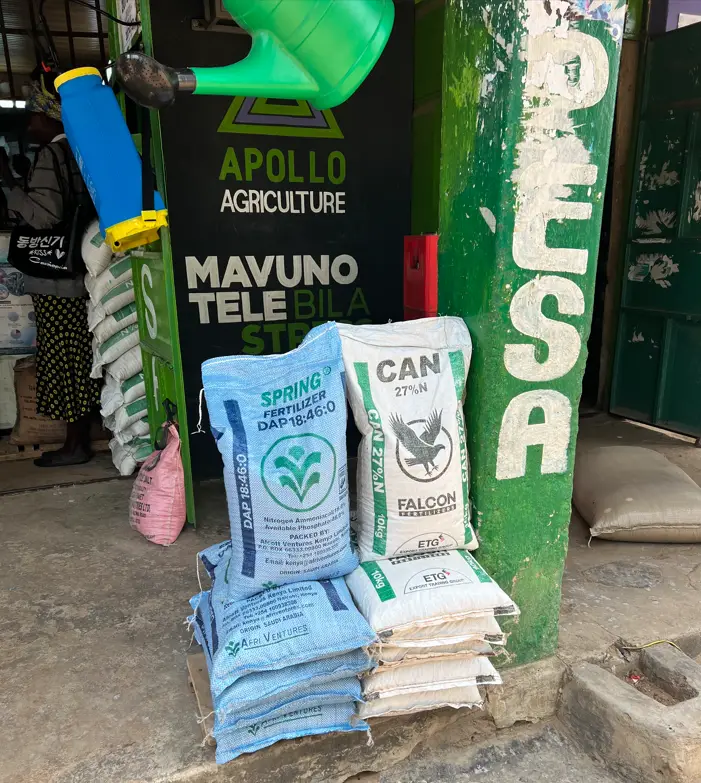- The Project will increase food production, income, and job creation for Kenyan smallholder farmers.
- Between 2024 and 2026, the project will support Apollo Agriculture Limited’s efforts to distribute fertilizers efficiently.
- The distribution strategy encompasses leveraging a portion of the company’s network, spanning 150 retail agro-dealers and 800 village-based agents, all under a digital platform.
The Africa Fertilizer Financing Mechanism has taken a significant stride in bolstering agricultural sustainability and productivity in Kenya by extending financial support to Apollo Agriculture Limited. This strategic move involves a $2 million partial trade credit guarantee and a $219,000 grant funding, aiming to facilitate the distribution of over 7,000 tonnes of fertilizers to approximately 100,000 smallholder farmers across the country.
The financial assistance provided by the mechanism reflects a commitment to addressing the challenges faced by smallholder farmers in accessing fertilizers, particularly those hindered by the lack of tangible collateral.
Target beneficiaries under Africa Fertilizer Financing Mechanism
Over the period from 2024 to 2026, the project will play a pivotal role in supporting Apollo Agriculture Limited’s efforts to distribute fertilizers efficiently. The distribution strategy encompasses leveraging a portion of the company’s network, spanning 150 retail agro-dealers and 800 village-based agents, all facilitated through digital platforms. This innovative approach not only streamlines the distribution process but also aligns with the contemporary trend of integrating digital solutions into agricultural practices.
The initiative recognizes and seeks to mitigate the prevailing challenges faced by smallholder farmers in Kenya when acquiring fertilizers. Traditionally, these farmers have relied on informal credit, microfinance institutions, and commercial banks for financing their agricultural inputs. However, a significant impediment has been the inability of some farmers to provide tangible collateral, limiting their access to essential resources.
The injection of $2 million in partial trade credit guarantee and the accompanying $219,000 grant funding marks a progressive step towards inclusive and sustainable agricultural financing through the Fertilizer Financing for Sustainable Agriculture Management project.
“The Fertilizer Financing for Sustainable Agriculture Management project will improve farming productivity by facilitating access and use of fertilizer for smallholder farmers at the last mile, with 50 percent of women among the beneficiaries,” said Marie Claire Kalihangabo, Africa Fertilizer Financing Mechanism Coordinator.
Making farming inputs affordable
The fertilizer market’s leading players include importers, blenders, and the Kenyan government, which runs a fertilizer subsidy program. In 2021, Kenya imported 758,000 tonnes of chemical fertilizers. Kenyan farmers pay roughly $35 for a 50 kg fertilizer bag.
Benjamin Njenga, co-founder of Apollo Agriculture Limited, said: “Apollo Agriculture is pleased to establish a partnership with the Africa Fertilizer Financing Mechanism to make essential farming inputs accessible and affordable to small-scale farmers, thereby boosting farmer income and Kenya’s food security.”
The Board of Directors of the African Development Bank approved the Fertilizer Financing for Sustainable Agriculture Management project on 13 October 2023. It aligns with the Bank’s Feed Africa Strategy because it will stimulate the private sector’s fertilizer financing in Kenya, improving food productivity and security. It ensures the continuity of the Bank’s Country Strategy Paper 2019-2023 for Kenya and the Bank’s Technologies for African Agricultural Transformation Programme.
Read also: Tanzania and Morocco to finalize deal on a fertilizer facility
Fertilizer usage in Kenya
In Kenya, maize emerges as a pivotal crop, commanding nearly half of all field-grade fertilizer consumption in the country. The primary fertilizers employed for maize cultivation are diammonium phosphate (DAP) and calcium ammonium nitrate (CAN). This emphasis on maize highlights its central role in the nation’s food security and economic stability. As the cornerstone of Kenyan agriculture, maize production not only sustains local livelihoods but also plays a vital role in shaping the country’s agricultural policies and resource allocation.
Tea, standing as the second most significant crop, follows closely in terms of fertilizer use. The fertilizers employed in tea cultivation include small amounts of muriate of potash (MOP) and nitrogen-phosphorus-potassium (NPK) formulations, with a notable emphasis on high nitrogen content relative to phosphorus and potassium. The tea industry’s reliance on specific nutrient ratios underscores the tailored and strategic approach to fertilizer application within Kenya’s diverse agricultural practices.
Horticultural crops collectively emerge as the third-largest consumers of fertilizers in Kenya. Among these, potatoes claim a substantial share of the total fertilizer usage. Meanwhile, floriculture stands out as a distinctive sector with specialized fertilizer requirements, reflecting the unique needs of flowering plants.
Coffee, another significant player in Kenya’s agricultural tapestry, utilizes a slightly smaller quantity of fertilizer compared to tea, primarily relying on NPK formulations and CAN. Beyond these key crops, other essential contributors to the mineral fertilizer consumption landscape in Kenya include wheat, tobacco, rice, and barley, each with its unique set of fertilizer preferences and agricultural practices.
